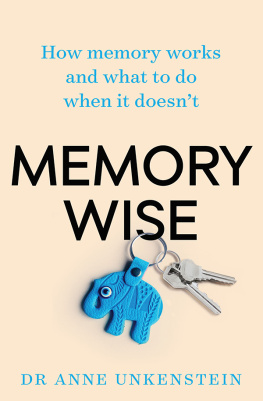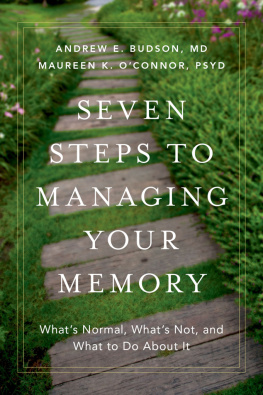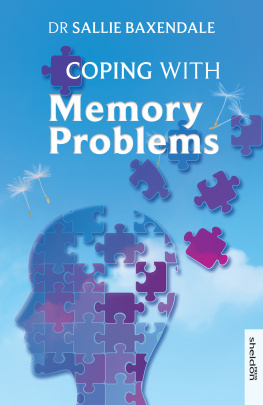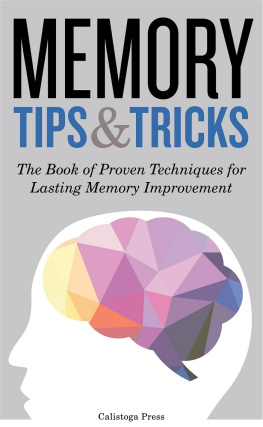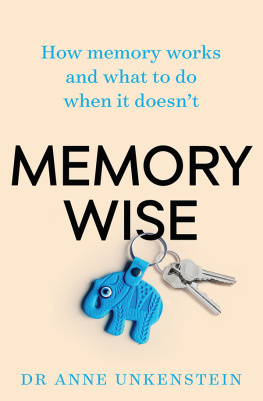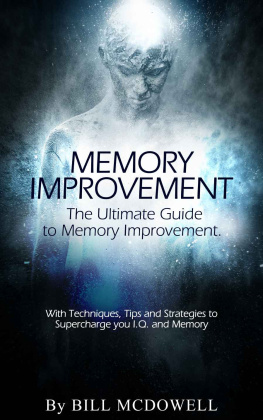
It is tempting to make all-or-none statements about memory as if it were a single concept. You might say, My memory is letting me down, for examplebut is it a problem with remembering what you did yesterday, or what you did when you were a child? If a person is said to have a fantastic memory, is it for remembering names, or for recalling faces? Is the same process at work when we recall facts and figures, as when we register a familiar aromathe salty sea air, gum trees, a roast in the ovenand it triggers a burst of feelings and memories we thought we had forgotten? What about community memory, represented in things like commemorative stamps, statues and symbols, in oral history, and in language itself?
Memory is mediated by culture: in some societies much more value is assigned to, say, musical memory skills, visualisation or the ability to remember complex dance movements than in others. Memory is individual: some of us remember the feelings and sense of events rather than the specific details; others have strong recall for facts and figures and are great to have on your team in a trivia quiz! Memory teamwork can work well, with an excellent memory for names complementing a strength in recognition of peoples faces.
Im not good at remembering jokes and trivia, but I can usually rely on my visual memory. This comes in handy when my children are rushing out the door saying, Has anyone seen my shoes? I can often drum up a distinct memory of the shoes under the couch, where they were left the night before!
Maria, 44
My sister has a fantastic memory for facts and details. She is a lawyer and needs to be able to recall this type of information for her work. Im different. I remember the feeling of things. I will go to a party, and forget what was said in the speeches or the name of the venue where the party was held, but I will remember the emotions that I felt whilst I was there and that it was a joyous occasion. I have always been like this.
Lucy, 62
Memory is, in fact, a very complex phenomenon: a whole book could be written outlining the current theories and debate about how memory works and its neurophysiological basis. The words that are used to describe various memory processes can be confusing, with terms like short-term memory and long-term memory meaning different things for different people. Without getting too technical, lets run though a simple model of memory to clarify memory terminology and to help understand which parts of the works could need special care and attention.
The starting point is to think of memory as a storage system. Storage facilities are all around us: the refrigerator, the pantry, wardrobes, computers, smartphones, libraries, even department stores. Of course, some systems are more streamlined than otherslocating a particular item in a library is usually much easier than finding the thing you want in your junk room!but the procedures for using them are the same. Think of your good old filing cabinet: you put your selected work-related documents, family budgeting information or recipes into labelled folders, you store them in the cabinet, and you get them out when you want them. In other words, you acquire information, you store information and you recall information. In principle, these same processes are also a part of memory.
Getting things you want to remember into the files (acquiring)
Temporary memory
So we have our filing cabinet ready to be filled up with more new memories. How do we get them in there? There are a few steps in this process.
First we pay attention to the informationwe need to be awake and alert hereand it goes into a small temporary store, often referred to as working memory. You could think of this temporary memory as your in-tray, which you keep on top of your filing cabinet. The working memory system temporarily holds and processes small amounts of information. Later the information goes into more enduring storage.
When temporary memory is used to repeat information for immediate use, this is how it works:
You do not process or manipulate the information that goes into it. The information gets in and sits in your in-tray without being checked over or organised in any way.
It can only hold a small amount of information at one time. Your in-tray is small and has a very limited capacity. It can hold five to eight items at one time.
The next information that you put into this temporary store will wipe out what was in it before. Each time new items are placed in your in-tray, the previous items are moved out to make more room.
Now, have a go at using this temporary memory process so that you can test out what were talking about.
Read the following telephone number slowly. When you have finished reading it, stop, and say the telephone number to yourself: 9412 5738.
Now, heres some more information to put into your in-tray. You are at a meeting and someone introduces himself to you. He says, Hi, Im Anton Pillay. Now repeat the name to yourself.
After you put the name Anton Pillay into your in-tray, you probably found it hard to remember the phone number that youve just repeated. If so, it was moved out, to make more room. This type of memory is good for remembering a phone number long enough to dial it, but doesnt last long enough for you to dial the same number again half an hour later (or even five minutes later!).
Enduring memory
Lets say that you want to save that phone number for later use, but you dont have a pen and paper handy to write it down or your phone at hand to type it straight in. Or perhaps you want to remember Anton Pillays name because you are likely to meet him again. To remember these bits of information later, you will have to move them from your in-tray into more durable storage, inside your filing cabinet.
To make the information more durable you will have to process or manipulate it in some way. These manipulations can happen without you being aware of it, but more often you do them intentionally. For example, you might repeat a number a few times or divide it into two or more sections to be remembered separately; you might repeat a name a few times, concentrate on its spelling or think how it is similar to the name of a person that you know very well. People sometimes use quite complex reminders which have personal significance.
I will always remember the phone number for our local take-away pizza shop. The first digits are the local dialling code, and the last four digits are 1956, the year that the Olympics were in my home townMelbourne!
Jack, 32
When it is a name which is likely to be very important for me to recall accurately, I consciously change the way I am standing or sitting when I hear the name, repeat the name after I have left the person and as soon as possible find a pen and paper to record it.
Delys, when she was in her sixties
At other times, people acquire or collect new memories without realising it until they recall them later. This could happen when you are looking for your keys, for example. When you put the keys down, you didnt try to remember where you put them. However, when it comes to finding them later, most times you will remember without too much active recalling where you put them.
Whether new information gets in intentionally or not, it still goes through the same basic processing. Its just that sometimes you dont realise the process is occurring. You pay attention to something, it goes into your temporary memory in-tray and, from there, it is processed for the more durable storage files within your memory filing cabinet.
Scientists believe that information can be more difficult to get out of a memory file later on if it has not been processed in a meaningful and well-organised way. For instance, if you shove something into your filing cabinet in a rush, without paying attention and stopping to think about which file it should be put in, it can be difficult to find again later. If, on the other hand, you classify it, label it, and put it into a mental folder that contains other similar files, it should be much easier to locate later on.
Next page
